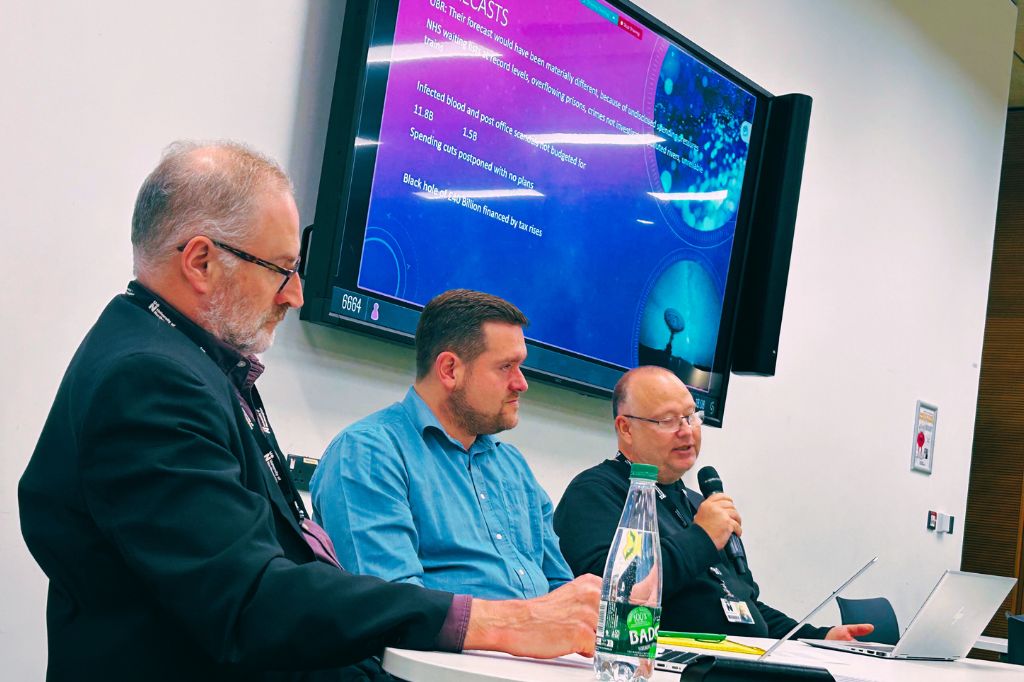Budget is a missed opportunity – according to university experts
Date 1.11.2024
1.11.2024
The Budget will reduce the pain of austerity, but political capital has gone unspent, according to experts at the University of Northampton (UON).
During a panel discussion on Wednesday evening reacting to this Labour Governments first Budget, UON’s lead economist and politics lecturer said there are measures that will make life easier for some, harder for others, but the Chancellor could have done more.
Marco Gundermann, UON’s Head of Economics and International Relations said by raising an extra £40 billion in taxes, the Chancellor Rachel Reeves had set the ‘most remarkable Budget in two decades, if not more.’
Marco said there were positive measures in terms of spending on the NHS, education and defence, but the country still had to expect cuts to other public services.
He also said it would be a boon for those on a National Living Wage who will see an increase in their pay packets, and that Carers would be able to earn more in part time jobs before they see a cut in their Carers Allowance.
However, employers will be hit hard by the increase in their contributions to National Insurance, but more so because employees will now only need to earn £5,000 a year before their employer has to pay NI, compared to the current threshold of £9,100.
Marco welcomed the extra spending in investment and changes to the fiscal rules which increase flexibility and added: “When we remember the mini budget that was so disastrous that would have trebled borrowing, this budget increases borrowing by just 1% per year, so it’s no comparison.
“But I think that’s not just praise, that’s also a criticism because I think they could have gone further, they could have done more. They could have increased borrowing more. And the financial markets are really quiet today, Government borrowing costs has gone up a little bit, they’re at a five-month-high, that’s nothing. So, I think they could have gotten away with more borrowing, it’s maybe a missed opportunity.”
Marco said there was not enough in the Budget to address problems in social care, there was nothing to help local councils, nothing for child poverty and he also said the £22 billion black hole left by the Conservative Government could have been almost filled by reversing the decision to change students visas which was costing the UK economy £15 billion a year.
After his Budget analysis, Marco handed over to David Waller, UON’s Senior Lecturer in Politics who said the Government had been over cautious sensing a weak political position.
He said: “Observers are criticizing Sir Kier Starmer for the fact that he’s not really managed to make the transition from a politician who is leading a party in an election campaign into a head of a Government with a large majority, in a political system that gives a lot of power to the executive.
“So, if Starmer had wanted to be bold then this was the moment that he could do it, I don’t just mean this moment and the budget, but the period of time between election and now. And yet this caution has persisted.
“So, I think the jury is still out on what the government strategy will be. Is it simply avoiding so called ‘Tory chaos’ and making good some of the damage of the last 14 years, or whatever your time scale might be according to your particular political inclination. Or does Labour genuinely seek to move Britain in a new direction with a fundamentally different economic strategy that’s fit for the ambition of reviving growth? And growth of course is absolutely necessary for generating the additional revenue that’s needed for restoring public services without the excessively large tax rises that would be unpopular.”
The panel discussion entitled ‘The Budget: What will Change? took place at the University of Northampton and was hosted by Martin Steers, Station Manager at Nlive Radio.
You can listen to their full discussion via the Nlive Radio listen again service, or watch the recorded livestream on Youtube.